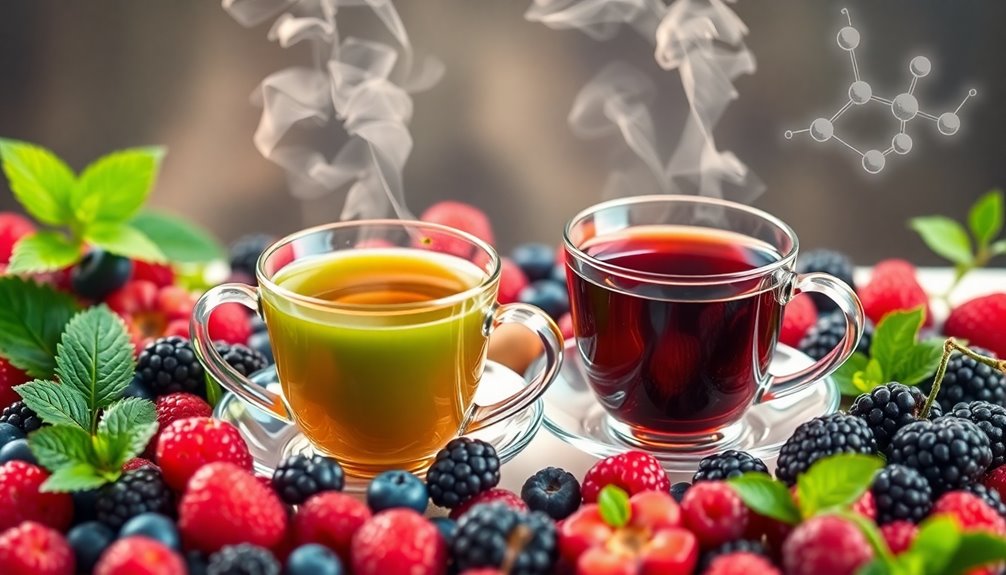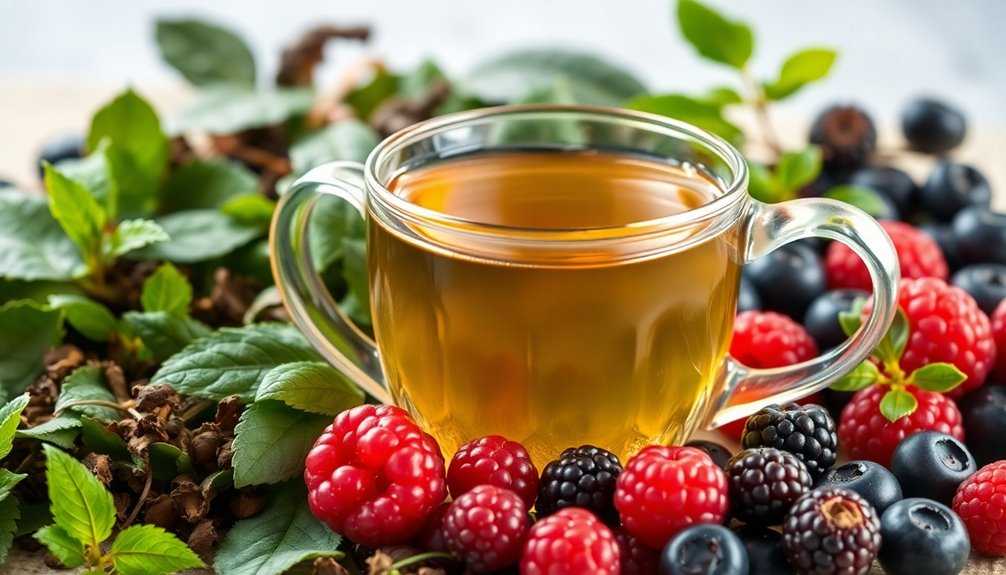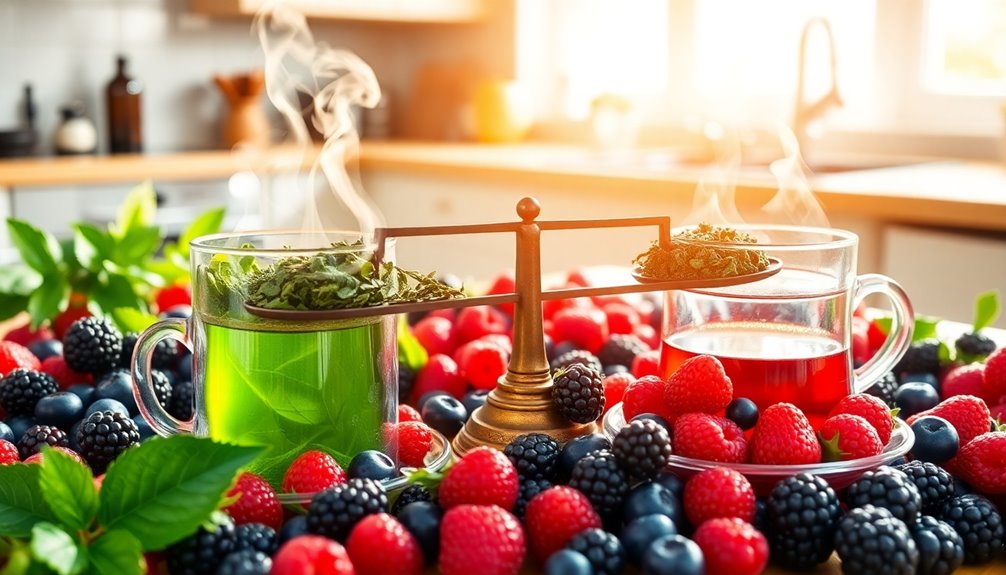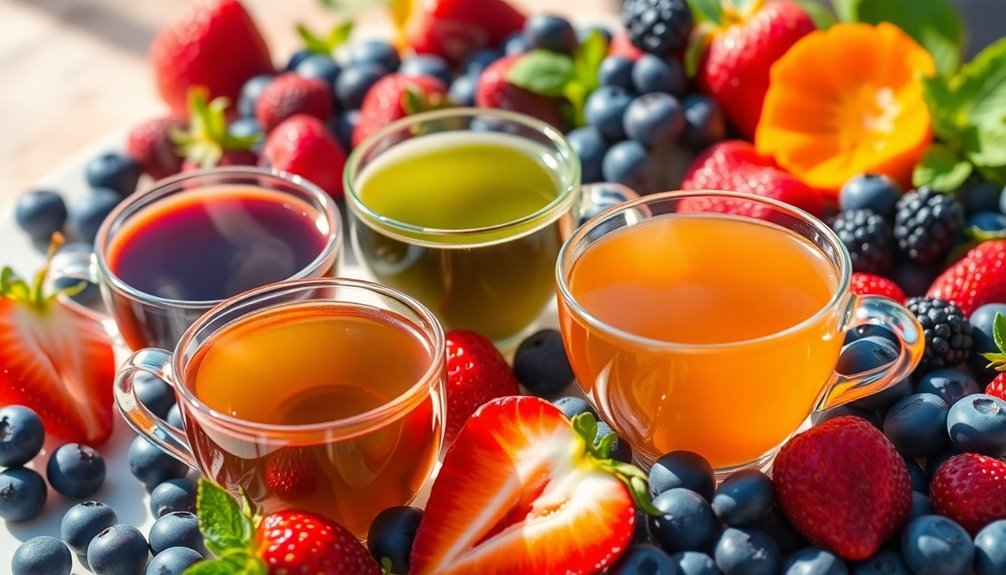Scientists confirm that tea outperforms berries in antioxidants. Green tea, for instance, can have a total antioxidant capacity of up to 6200 μmol Trolox/100 mL, far surpassing many berry varieties. Its high catechin levels, especially EGCG, are incredibly effective at fighting free radicals—20 times more so than vitamin C. Beyond antioxidants, tea also supports brain health and enhances focus, thanks to caffeine. By incorporating tea into your daily routine, you'll not only enjoy its taste but also its numerous health benefits. Keep going to uncover more fascinating insights about tea and its advantages!
Key Takeaways
- Tea, particularly green tea, contains higher levels of antioxidants, with a total antioxidant capacity significantly surpassing that of berries.
- Green tea's catechins, especially EGCG, are 20 times more effective than vitamin C in scavenging free radicals.
- Black tea converts catechins into theaflavins and thearubigins, enhancing its antioxidant properties beyond those found in berries.
- Regular tea consumption supports cardiovascular and brain health, offering additional benefits not typically found in berry consumption.
- Brewing techniques can optimize tea's antioxidant content, further enhancing its superiority over berries in health benefits.
Introduction

You might often hear about the health benefits of berries, but recent research reveals that tea, especially green tea, actually packs a more powerful antioxidant punch.
Green tea is rich in polyphenols, particularly catechins like EGCG, which are up to 20 times more effective than vitamin C at scavenging free radicals. This makes green tea a formidable ally in combating oxidative stress.
In fact, studies show that green tea achieves total antioxidant capacity (TEAC) values ranging from 480 to 6200 µmol Trolox/100 mL, significantly surpassing the antioxidant levels found in various berries. This impressive TEAC indicates that integrating green tea into your diet could offer greater health benefits than relying solely on berry consumption.
However, it's essential to note that the antioxidant properties of tea can vary based on brewing methods. Proper preparation techniques enhance its flavonoid and polyphenol content, maximizing the health benefits you derive from each cup.
Tea's Antioxidant Levels Compared

When it comes to antioxidant levels, green tea stands out as a powerhouse compared to other tea varieties. Research shows that green tea boasts an impressive antioxidant capacity, with TEAC values ranging from 480 to 6200 µmol Trolox/100 mL. Herbal teas, particularly those containing turmeric and ginger, can also provide complementary health benefits and are often praised for their medicinal purposes.
In contrast, black tea has TEAC values between 143 and 3100 µmol Trolox/100 mL, while earl grey tea offers only 728 to 1205 µmol Trolox/100 mL. The major polyphenol in green tea, EGCG, is particularly noteworthy; it's found to be 20 times more active than vitamin C regarding antioxidant capacity. While black tea does contain beneficial compounds like theaflavins and thearubigins, it still lags behind green tea in overall antioxidant activity. Your brewing methods can also significantly affect the total polyphenol content and antioxidant properties of your tea. Additionally, the type of tea leaves used can influence the caffeine content and antioxidant levels, making selection important.
If you're looking to boost the antioxidant levels further, consider adding honey. Studies indicate that honey-infused black tea can achieve TEAC values of up to 668.6 µmol Trolox/100 mL, enhancing its health benefits.
Tea Contains Higher Catechin Levels

Building on tea's impressive antioxidant levels, catechins play a significant role in its health benefits. When you drink green tea, you're tapping into a powerhouse of catechins, which make up about 80% of the total catechins found in fresh tea leaves.
Green tea contains around 30% catechins by dry weight, giving it a higher antioxidant capacity compared to most berries. The standout catechin, EGCG (epigallocatechin gallate), is known for its exceptional ability to scavenge free radicals—20 times more effective than vitamin C!
Black tea, while processed differently, also retains catechins, transforming them into theaflavins and thearubigins. These compounds still deliver substantial antioxidant benefits, further enhancing tea's profile.
Studies show that the overall antioxidant capacity of tea, as measured by TEAC values, consistently surpasses that of many berry varieties. Additionally, regular consumption of tea can complement a balanced diet that includes various nutrients essential for overall health.
When you choose tea, you're not just enjoying a delicious beverage; you're also boosting your intake of powerful antioxidants that can support your health.
Tea's Catechins Enhance Brain Health

Tea's catechins, particularly the powerful EGCG, play a crucial role in enhancing brain health by combating oxidative stress. This remarkable compound is 20 times more active than vitamin C in terms of antioxidant capacity, making it a significant ally for your brain. The benefits of raw food diets may also enhance overall health, complementing the protective effects of tea. Additionally, the caffeine content in green tea can provide a gentle energy boost, supporting mental clarity and focus. Regularly sipping green tea can lead to neuroprotective effects, potentially lowering your risk of neurodegenerative diseases like Alzheimer's and Parkinson's. The antioxidant properties of catechins stimulate your central nervous system, which may enhance cognitive function and memory. Traditional tea ceremonies not only promote relaxation but also encourage mindfulness, which can further benefit brain health. Furthermore, studies suggest that herbal teas like rosemary may also support neuroprotection and cognitive enhancement.
By improving blood flow to the brain, the polyphenols found in tea support overall cognitive performance. This boost in blood circulation helps ensure that your brain receives the nutrients it needs to operate efficiently.
Moreover, green tea supplementation can promote collagen and elastin production in the skin, indirectly contributing to healthier brain function by maintaining overall physiological health. Additionally, flower teas offer a diverse range of antioxidant benefits that can complement your health routine.
Caffeine Content in Tea

Caffeine plays a significant role in the appeal of traditional teas, offering a gentle boost to your day. Derived from the Camellia sinensis plant, caffeine content varies among different tea types.
For instance, an average cup of black tea contains between 40 to 70 mg of caffeine per 8 oz serving, while green tea typically has about 20 to 45 mg. Oolong tea sits comfortably between these two, averaging around 30 to 50 mg per cup.
The caffeine content isn't fixed; it's influenced by factors like brewing time and temperature. A longer steeping time or higher water temperature can extract more caffeine, enhancing the tea's invigorating effects.
If you prefer a lighter option, decaffeinated teas are available, but keep in mind they may still contain trace amounts, usually 2 to 5 mg per cup.
Understanding the caffeine content in your favorite teas helps you choose the right one for your needs. Whether you're enjoying the robust flavor of black tea or the delicate notes of green tea, each sip not only boosts your energy but also contributes to tea's overall antioxidant capacity.
Practical Applications

Understanding the health benefits of tea goes beyond its caffeine content; practical applications of its antioxidant properties can enhance your daily wellness routine. By incorporating green tea and black tea into your diet, you can significantly boost your antioxidant capacity.
Green tea, rich in EGCG, offers up to 20 times the free radical scavenging power of vitamin C, making it a potent ally against oxidative stress. Additionally, kombucha tea is another excellent source of antioxidants that can be easily included in your wellness regimen. To further enhance your tea experience, consider perfecting Earl Grey tea as a delightful option with its unique flavor profile. Furthermore, incorporating yerba mate into your routine can also provide a rich source of antioxidants and other beneficial compounds. Recent studies have shown that the addition of essential oils can further amplify the health benefits of your tea experience.
To maximize these health benefits, pay attention to brewing techniques. Steeping your green or black tea for the right amount of time can enhance the extraction of polyphenols and other antioxidant compounds. For instance, brewing black tea at higher temperatures for a shorter duration can yield impressive antioxidant activities.
You can also elevate your tea's total antioxidant capacity by adding honey, which can push TEAC values to impressive levels. Additionally, considering the antioxidant benefits of chia seeds can further complement your wellness routine by providing a rich source of antioxidants alongside your tea.
So whether you enjoy a warm cup of green tea in the morning or a refreshing iced black tea in the afternoon, you're not just indulging in a flavorful beverage; you're actively supporting your health.
Embrace these practical applications and let tea be your go-to source for antioxidants.
Conclusion
In conclusion, you can feel confident choosing tea over berries for a powerful dose of antioxidants. With its high catechin levels, tea not only boosts your overall health but also enhances brain function. Plus, the caffeine content gives you that extra perk to stay alert and focused. So, next time you're looking for a healthy beverage, reach for a warm cup of tea and enjoy all the benefits it brings to your well-being!










